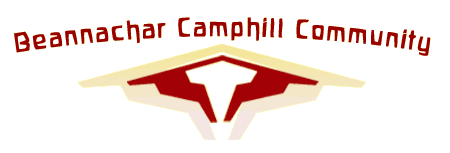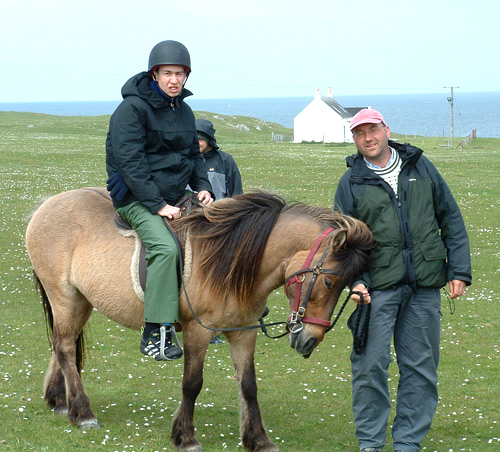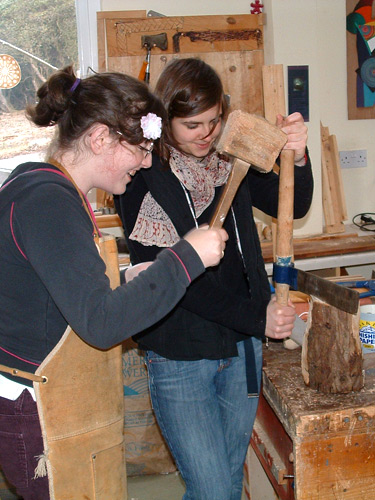
Students
The "students" are young people aged between 18 and 30 who have special needs. Most are able to work to some degree. The community functions best when there is a balance between the able and the less able students.
Beannachar produces two handbooks, one for prospective students thinking of joining us: "An introduction to Beannachar", and one for students who work or live here: "Students' Handbook".
Please contact us if you would like us to send you one of the handbooks.
Student Applications
The procedure for the admission of students is as follows:
- An initial visit is made by the prospective student; his/her parents and, either at the same time or on a different occasion, his/her social worker or care manager. Brochures are handed out to everyone concerned at the end of this visit.
- Following this visit, if all parties wish to proceed, application forms will be sent out and if appropriate a formal interview will be set up, to which everybody who is concerned with the applicant, as well as the prospective student themselves will be invited. Our medical consultant may also attend the interview if it is felt that a significant amount of input will be needed to accompany the placement. At this interview the expectations of all concerned will be discussed.
- After the interview a trial visit is arranged at a mutually convenient time. This visit would normally be for four weeks, but in some special circumstances it may be shorter, or two spells of a fortnight each. Before offering a place here, we find it essential that the prospective student would make it clear, by whatever means available to them, that they themselves wish to come. In some cases this may only be possible after a second, sometimes longer visit of e.g. six weeks or three months.
- All necessary arrangements for funding, appointeeship and contractual agreements will take place before admission, including the signing of Beannachar’s ‘Terms and Conditions’ and ‘Financial Agreement’, by the appropriate person from the students’ Social Work Department.
- When a student comes to join us, possibly on the day of admission or up to 4 weeks later, depending on the individual circumstances, a meeting will be held between the student, co-workers from Beannachar, the parents and social worker/care manager to clarify the aims of his/her placement here. These initial aims will then be taken forward in the form of a personal development plan, via the monthly record sheets to the reviews, so that changes and developments can be carefully monitored and documented.

Leaving
 Beannachar sees its task as a training centre, helping the young person to develop the skills
necessary to find his/her place in life. It is therefore important, from quite early on, to look ahead, and to prepare for
the process of leaving at every level. At the reviews, the student, the parents and the social
worker can exchange their experiences and their views on what the next step
could be. Experience has shown that between two and three years is a realistic time-span for finding a new
situation. However, in some instances of extremely problematic behaviour we may insist on our right to
dismiss a student at short notice, generally four weeks.
If the placement of any particular student is in a critical phase or in
jeopardy, a “break-down of placement” agreement would be drawn up between
social worker/care manager, Beannachar and that individual student and/or their
representative.
Beannachar sees its task as a training centre, helping the young person to develop the skills
necessary to find his/her place in life. It is therefore important, from quite early on, to look ahead, and to prepare for
the process of leaving at every level. At the reviews, the student, the parents and the social
worker can exchange their experiences and their views on what the next step
could be. Experience has shown that between two and three years is a realistic time-span for finding a new
situation. However, in some instances of extremely problematic behaviour we may insist on our right to
dismiss a student at short notice, generally four weeks.
If the placement of any particular student is in a critical phase or in
jeopardy, a “break-down of placement” agreement would be drawn up between
social worker/care manager, Beannachar and that individual student and/or their
representative.
As stated in our Terms and Conditions, responsibility rests with the relevant social work department to identify a new placement for any student who leaves Beannachar. Co-workers in Beannachar will assist and promote this process as far as is possible and appropriate, especially by helping to prepare the student for a change in their life. This may take the form of facilitating interviews, visits or trial periods, and also of communicating with the prospective placement with regard to the student’s particular needs. The student’s parents will be kept informed of, and involved in, this leaving process, and it will be monitored in reviews.
